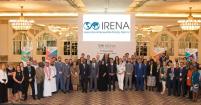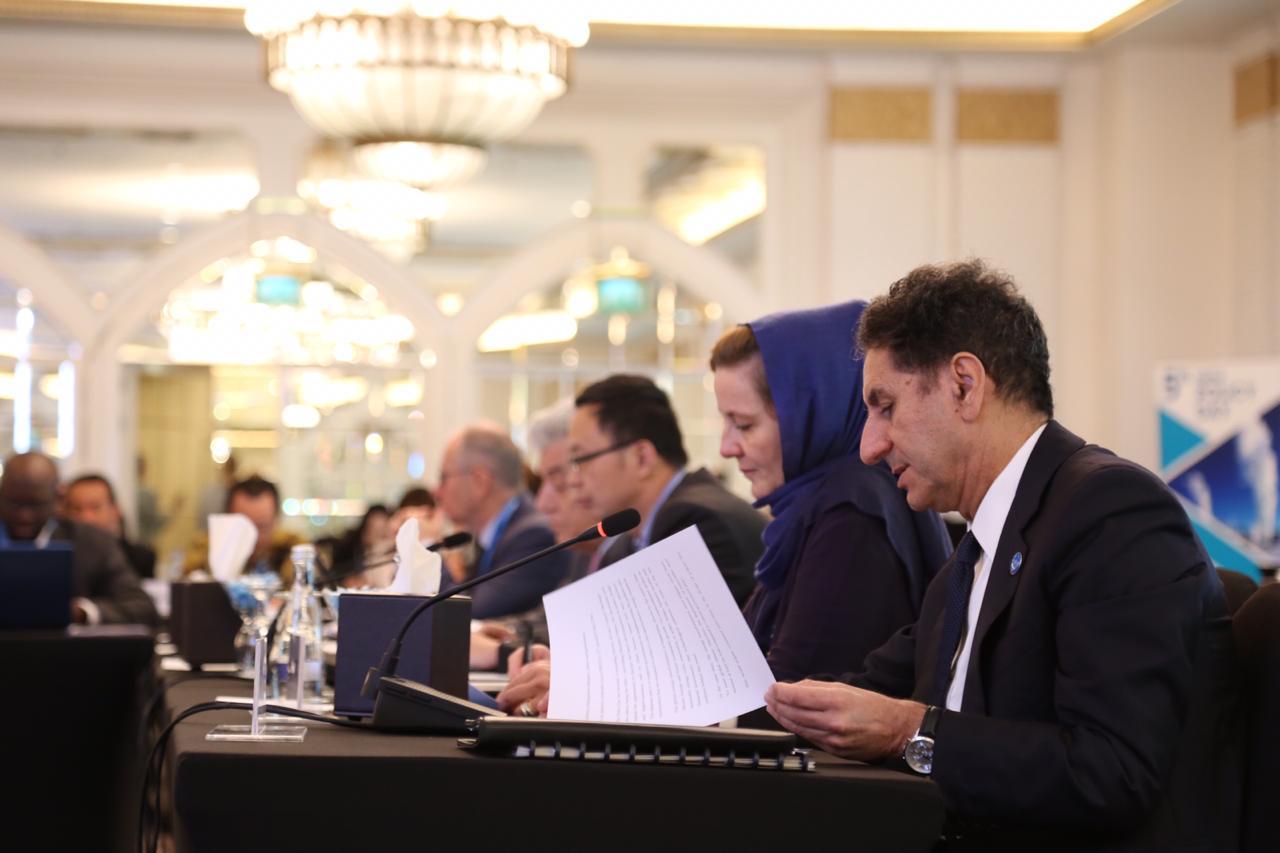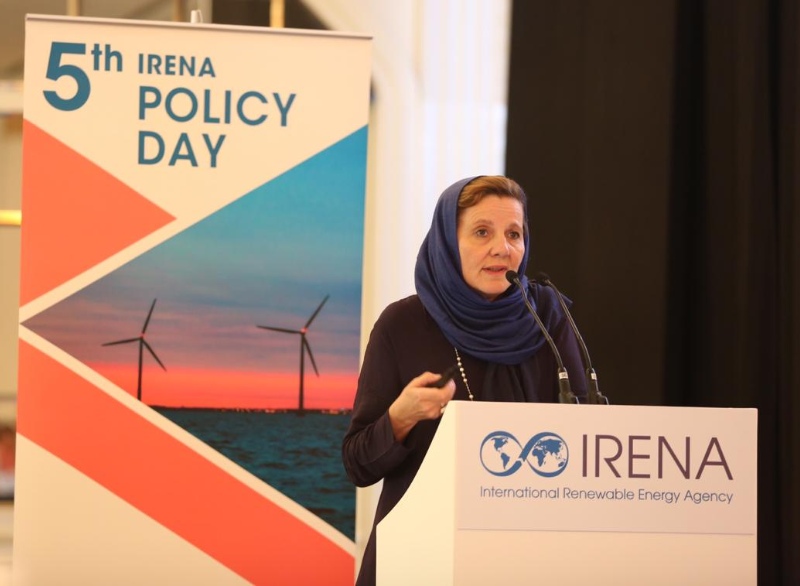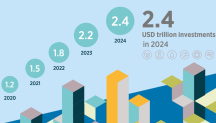

IRENA's Policy Day – Unlocking Investment to Boost Renewables
Newsletter
How to attract renewable energy investment in times of global energy transition? As over 300 delegates gathered in Abu Dhabi for IRENA’s spring Council, the Agency’s fifth Policy Day brought together policy-makers, institutional partners and private sector representatives to discuss enabling frameworks and finance mechanisms to accelerate investment in renewable energy and maximise the socio-economic benefits.
“While renewable energy investment currently exceeds USD 300 billion per year, there is still a lot to be done to lower the persistent market barriers that hinder the necessary capital scale-up,” said IRENA’s Director-General Francesco La Camera at the opening. “IRENA’s work on renewable energy finance includes analysis of investment trends and more importantly of investment gaps, with a current focus on institutional investors, financing of off-grid renewables and innovative financing instruments.”

The Policy Day kicked off with a dialogue on action needed on the ground to align energy policies with climate objectives, unlock investment, scale-up renewable energy projects and strengthen local capabilities. Participants addressed a mix of policies and finance solutions to transform the energy system at the national and local level, with real life examples from different countries and regions.
Mahama Kappiah, Executive Director of the ECOWAS Centre for Renewable Energy and Energy Efficiency (ECREEE), and Goddy Muhanguzi Muhumuza, Secretary of the East African Centre of Excellence for Renewable Energy and Efficiency (EACREEE), described investment challenges for renewables in different regions of Africa. “Clear policies and long-term planning covering all sectors are needed to attract private investors in the region,” Mahama said. “It should take a multi-sectoral approach, that goes beyond power, involving transport, heating, cooling, healthcare and education.”
China plays an active role in financing renewable energy projects across the globe. “Policy and financing are twin brothers”, said Prof. Zhongying Wang, Director of China’s National Renewable Energy Centre (CNREC) and Acting Director of the Energy Research Institute (ERI). “Today, renewables compete with fossil fuels, but they don’t have a fair environment to compete with them. We need policy action to reduce and finally stop these subsidies.” Delegates from Saudi Arabia and the United Arab Emirates (UAE) provided the perspective of oil-rich countries, looking at drivers for the energy transition. “Competitive pricing structures provide long-term stability for investors,” said Nawal Al-Hosany, UAE’s Permanent Representative to IRENA. “What allowed the UAE to be at the forefront of energy diversification has been the establishment of a pricing structure that’s led to record low-price solar energy.” Raed Bkaryat from the Energy Ministry in Saudi Arabia added that “the private sector is looking for competitive options including auctions.”
Renewable energy auctions can be designed to meet country-specific objectives, while corporate sourcing of electricity can fulfil both investment and sustainability goals. Countries must sometimes make trade-offs between achieving the lowest priced power, integrating variable renewables like solar or wind power, and ensuring fairness and inclusivity.
Insights on renewable energy auctions
IRENA presented preliminary findings of an ongoing report on Renewable Energy Auctions: Status and Trends Beyond Price. Auctions continue to support the deployment of renewables-based power, revealing competitive pricing around the world, with solar PV and wind accounting for 97% of total global auctions in more than 50 counties in 2017 and 2018, the report preview shows.
“Auctions designs should be flexible as they heavily depend on each economy’s context,” said Adil Hanif from the European Bank of Regional Development (EBRD). “There is enough institutional, investor’s money in the system. The challenge is to find the right project. Policy-makers are enablers for an environment where the private sector can deliver.”
Elvira Lopez Prados from Acciona provided insight from the private sector. “Companies need long-term visibility, stable policies and a clear competitive mechanism when it comes to auctions,” she said.
Risk mitigation for renewables
The design of auctions, like other deployment policies, considers the allocation and management of risks related to renewable energy projects among stakeholders. Standardisation of contracts, for example, can help reduce project risks. Jean-Pascal Pham-Ba of the Terrawatt Initiative highlighted the role of Open Solar Contracts in improving access to finance and in turn lowering electricity prices. Different types of risk mitigation instrument are applicable to renewable energy projects. Pierre Telep of the Green Climate Fund (GCF) which provides funds and project facilitation to developing countries, highlighted the importance of policies, project design and project-based transactions for the risk mitigation of renewable investment. Tusekile Kibonde from the Africa Trade Insurance discussed difficulties in insuring renewable energy projects, focusing on project failures at early stages due to risks that could not be mitigated. IRENA also presented its risk mitigation instrument Risk Assessment and Mitigation Platform (RAMP).
Ensuring inclusiveness
Throughout the Policy Day, Members and stakeholders shared experiences and best practices in policy-making to ensure that all countries benefit from socio-economic gains of the energy transition, including economic growth and job creation. Today, the renewable energy sector provides 11 million people with work globally, as outlined in the Agency’s latest report on Renewable Energy and Jobs.
 “A set of enabling and integrating policies can ensure a just and broadly inclusive energy transition,” said Rabia Ferroukhi, the Director of IRENA’s Knowledge, Policy and Finance Centre. “Such a framework includes a broad range of action in several inter-linked policy fields like industrial, labour market, education and financial policy. These policy fields are closely aligned. The success of one policy measure rides on progress in the others”.
“A set of enabling and integrating policies can ensure a just and broadly inclusive energy transition,” said Rabia Ferroukhi, the Director of IRENA’s Knowledge, Policy and Finance Centre. “Such a framework includes a broad range of action in several inter-linked policy fields like industrial, labour market, education and financial policy. These policy fields are closely aligned. The success of one policy measure rides on progress in the others”.
"Morocco’s mix of policies have supported the development of local capabilities and domestic supply chains. This has produced benefits nationally and locally," said Yasmina Benmessaoud from the Moroccan Agency for Sustainable Energy (Masen). “We want that the maximum of people benefit from renewable energy including regional and local communities”, she added. The same can be said about South Africa. Mokgadi Modise, the Chief Director of Clean Energy at the Department of Energy highlighted that “policies must be implemented in an integrated manner when shifting from fossil fuels to clean energy. Local content, skills transfer, and skills development must be taken into account.”
In conclusion, for true sustainability, the policy framework can be designed to extend the benefits of energy transformation to all people and communities. Countries have gained a range of insights on integrating renewable energy deployment with a broader mix of socio-economic policies. This can help to address transition challenges and ensure the best outcome for society at large. To maximise the benefits of overhauling the energy system, governments can adopt different measures depending on geographic, economic and social context.




